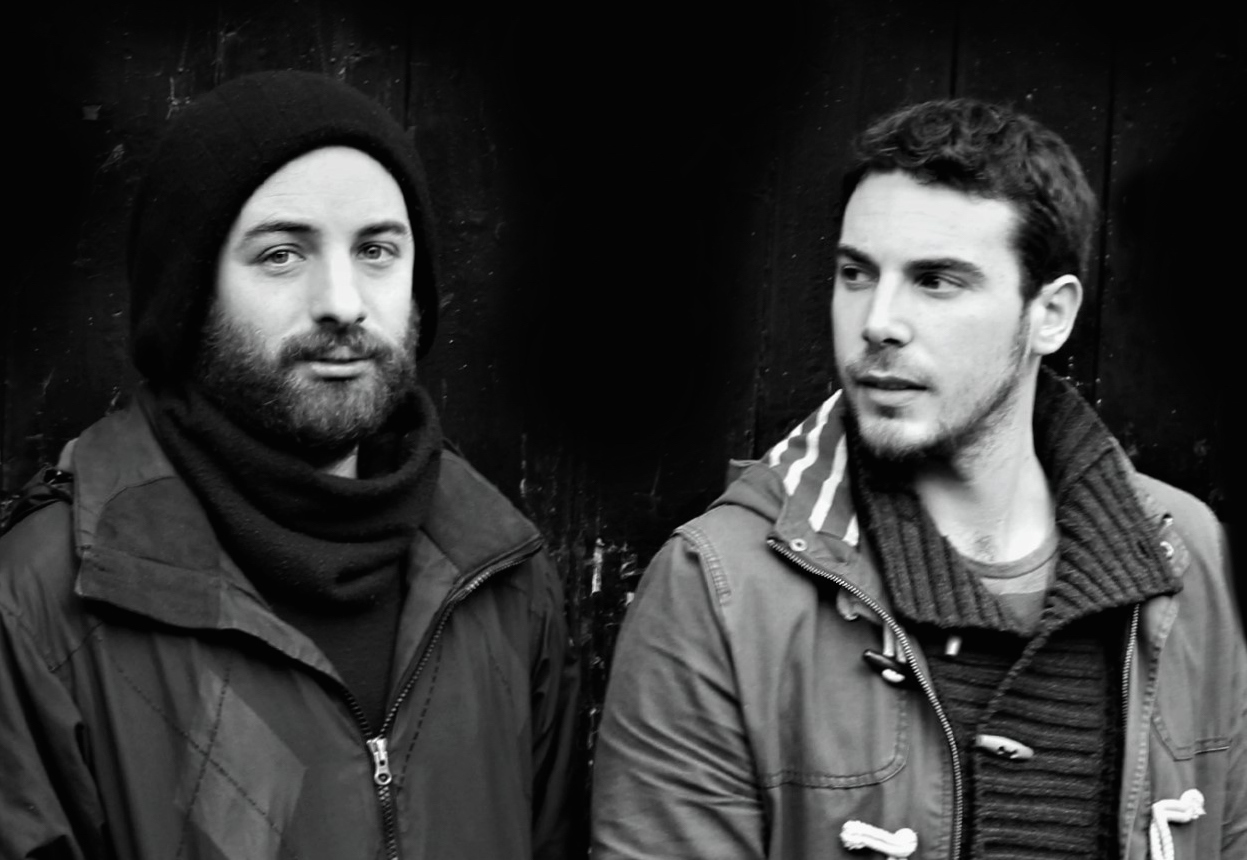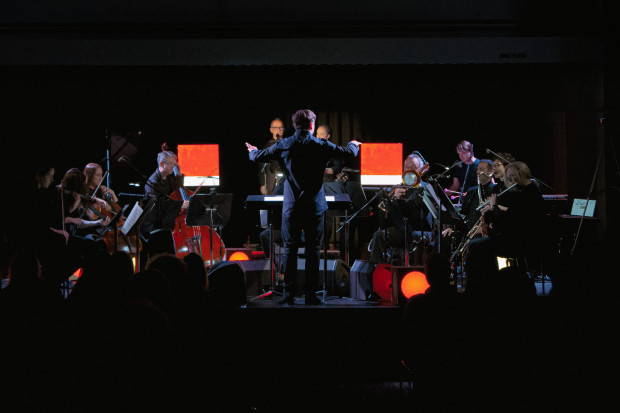
Nick Roth and Matthew Jacobson (Picture: Olesya Zdorovetka)
‘People want to break down boundaries’: An interview with Nick Roth and Matthew Jacobson of Diatribe Records
This year at the New Music Dublin festival, one of the major features of the event is a Diatribe stage that will feature five concerts launching seven new albums from the Dublin-based label. It’s a significant moment for the company, which will bring its catalogue to 40 recordings over 13 years, a major documentation of the Irish contemporary and improv music scenes.
While musicians Nick Roth and Matthew Jacobson have been the directors for the past decade or so, the label’s origins lie in a recording by Jacobson’s brother Daniel who released ZoiD Versus the Jazz Musicians of Ireland Vol. 1 in 2007 under the label title. Writing in the Journal of Music at the time, Rob Casey said of the recording, ‘Each track … pits one of the musicians against a primarily beat-driven electronic sound world… The soloists … weave lines between the detritus of their own spliced phrases….’
This album was followed by recordings from White Rocket (featuring Greg Felton, Jacob Wick and Sean Carpio), composer Ian Wilson, and the world music group Yurodny’s debut which is when Roth became involved as founder of that band. Since then the label has continued to grow, and, with other Irish independent labels such as Raelach, Ergodos, Far Point, Heresy and Dot Dot Dot Music, it forms an essential part of the current music scene. The labels actually formed a National Association of Record Labels Ireland (NARLI) and each year at their AGM they take the opportunity to perform and improvise together.
Ahead of its time
Multi-album projects such as they will present at New Music Dublin are not unprecedented for Diatribe. In 2015, they released a major quartet of albums including Kate Ellis’ Jump, Cora Venus Lunny’s Terminus (Conscientiae), Adrian Hart’s Cuisle and Caoimhín Ó Raghallaigh’s Music for an Elliptical Orbit. The latter sold out almost immediately and has already received over 4 million plays on Spotify.
‘We were in the right place at the right time with that record,’ says saxophonist and composer Roth.
Caoimhín was going through this real growth spurt as a musician and discovering a lot about his instrument and absorbing a lot of these influences. He’d just come back from working with Dan Trueman. There were all these forces at play and we were lucky enough to … get him in front of a microphone…. I think that record was ahead of its time… It really crystallises Caoimhín’s work at that time, which is the point of doing the label.
Other recordings released by the label include Benjamin Dwyer’s Scenes from Crow and Umbilical, Ed Bennett’s Togetherness, Cork Gamelan Ensemble’s The Three Forges, Simon Jermyn’s Hymni, Isabelle O’Connell’s Reservoir and Stargazer by Ensemble Ériu. But how have they managed to grow and sustain the label over the thirteen years? Roth, who is a composer and also teaches at the Irish World Academy of Music and Dance, continues:
It’s really just raw energy and passion. We don’t get paid as directors. We don’t get paid as producers. It’s really just an expensive hobby… When something comes to us, or when we start something off, it just kind of generates an energy and then we see it through. That’s a great feeling when you start to see the catalogue build up to where it is. The next seven releases we are bringing out at New Music Dublin, it’s almost a quarter of the catalogue in a weekend. It’s a real growth spurt for the label and putting out some of our best work. So the payback is very much an emotional and spiritual one. You are making something beautiful and bringing it out into the world.
For Jacobson, who is a jazz drummer and also teaches on the jazz degree at DCU, the music on the label is about artists saying something about their time:
I think people want to break down boundaries and try things that haven’t been tried before… There is so much bullshit around and people are just trying to play music that is in some way alleviating some of that… And that’s part of why we like the music because it all is very, very honest to us. It’s the music that people think needs to be in the world and I think we agree with them.
Learning the trade
As well as the artistic side, the two have found they have learnt a lot about running a label and have honed their skills in getting the best out of artists. ‘We’ve really got a lot better at making records, that’s for sure,’ says Roth.
At the beginning, we really were amateurs in the proper sense of the word. We had to learn on the job. I think we’ve now got to a point where we understand how many ducks in a row you have to have to make a great record. … We’re getting much better at doing that and getting a higher hit rate.
Getting the best out of musicians in a recording environment is also a fine art.
It’s about the energy that musicians have in the room. … Making a record, being in front of a microphone, is really exhausting, as any musician knows. … You need to maintain energy levels. A lot of the art of production is about creating a vibe in the room. It’s about making people feel relaxed. It’s about knowing when to take a break, when to push through…
Key to the Diatribe approach is using a group of skilled engineers, people such as Adrian Hart, Alex Bonney, Christopher Corrigan in SARC in Belfast, and Keith Lindsay. Jacobson explains: ’I think with a huge amount of the albums we’ve released, we’ve brought our own engineers to sessions. I think that’s something that really helps because essentially everyone in the room is somebody you trust.’
New departures
The albums that will be launched at New Music Dublin include a new release from composer and guitarist Benjamin Dwyer titled What is the Word. It’s a collection of Beckett-inspired works with performances from Conor Lovett (voice), Maya Homburger (baroque violin), Dwyer (guitar/prepared guitar) and Barry Guy (double bass). Roth feels that Dwyer’s work in particular deserves more attention.
I think Ben is one of the most important composers of his generation. He hasn’t been as recognised as some of his contemporaries. In some small way his representation on Diatribe has been kind of a way of trying to redress that balance. Scenes from Crow and Umbilical are his first two records and they are fantastic records … great performances, amazing compositions… I think one of the really interesting things about his career is that it’s changed quite dramatically in the last five to seven years.
Those changes, Roth suggests, are partly down to an even deeper engagement with improvised music on the part of the composer. Dwyer will give a performance of a selection of the works from the new album on the Saturday at New Music Dublin.
Flautist Lina Andonovska will also release an album on Diatribe called A Way A Lone A Last that features works by Barry O’Halpin, Judith Ring, Donnacha Dennehy and Roth. She will perform on Thursday 28 February and Jacobson will join her on percussion for one of the Roth works. Regarding Dennehy’s piece, Roth feels that it is ‘a departure for Donnacha in a way. It’s certainly got a chromaticism that I haven’t heard. It’s still got all the hallmark Dennehy moments but there’s something going on harmonically that introduces what could be called a new chapter.’
Pianist and composer Xenia Pestova Bennett will perform on 1 March at 3pm on the Diatribe stage, performing music from her album Atomic Legacies which will feature the Ligeti Quartet, and violinist Darragh Morgan and pianist John Tilbury will open the festival on 27 February with For John Cage by Morton Feldman, which is also one of the new Diatribe albums. The final three albums are by alto sax improvisers Guillaume Orti and Stéphan Payen, Microbes by the UK free improv trio BABs and a new album by Jacobson’s group ReDiviDeR called Mere Nation.
Network
While Diatribe as a label has an international network of artists, and has recently signed a distribution deal with Shell Shock and Proper, part of what Roth and Jacobson are trying to do with the label is raise awareness of the diversity of music happening in Ireland right now.
One of the big things that we’re trying to address is how Irish music is perceived internationally. There has been a huge focus on exporting Irish traditional music around the world, and obviously a lot of pop groups come from Ireland. But anything that’s more towards the improvised or the contemporary is hugely under-represented on stages and festivals around the world. That’s something we’re trying to say.
There are challenges in running a label, of course, and while Diatribe’s releases have received project support from the Arts Council and other institutions, the label receives no annual funding. They would like to see a hub where Irish independent labels could be based and they suggest that the renovation of the National Concert Hall could be a possible location. ‘It’s something you see in other countries,’ argues Jacobson, ‘a hub, a space where people rehearse or perform, a space for labels. It’s part of the cultural framework.’
‘It’s very hard to survive,’ says Roth, ‘in the cultural sector without either putting in a huge amount of your own personal energy or receiving some kind of infrastructural support from somewhere… and ideally both.’
The New Music Dublin festival at the NCH and other venues runs from Thursday 27 February to Sunday 1 March and features five Diatribe stage concerts. For full details, visit www.newmusicdublin.ie. For more on the label and its upcoming releases, visit www.diatribe.ie
As part of New Music Dublin, the Journal of Music will host a discussion titled ‘The Next 20 Years of New Music in Ireland: What Do We Need to Do?’ on Saturday 29 February at 5.15pm–6.15m in the Iveagh Room in the NCH. Panellists include Benjamin Dwyer, Lina Andonovska, Úna Monaghan and Adrian Smith. The event will be chaired by Toner Quinn.

















